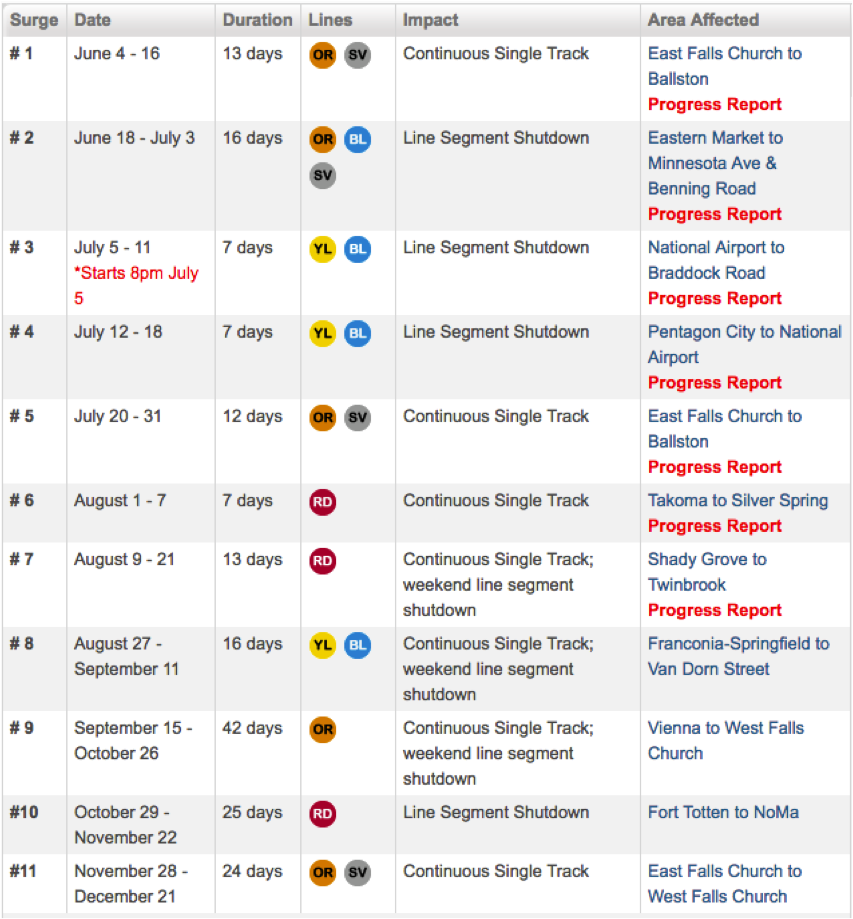September 22, 2016
As the Washington Metropolitan Area Transit Authority (WMATA) repairs its aging light rail system under the SafeTrack program, the House is considering a bill to provide federal employees living in the Washington, DC area with transportation network companies (TNCs) like Uber and Lyft.
WMATA’s rail system has been under fire in the past couple of years for a string of incidents with arcing insulators, smoke-filled metro cars, and – most recently – a derailment found to be linked to inadequate safety inspections. To resolve these issues, the SafeTrack program is executing concentrated repairs across segments of the system’s 6 lines.
Now in its sixth of fifteen “Safety Surges”, the accelerated track work plan combines line segment shutdowns, single tracking, and weekend shutdowns with reduced hours of operation. According to WMATA, the intensive program will whittle down three years of work to one year.

This has resulted in reduced system capacity and longer travel times, leading WMATA to provide limited bus service in affected areas and encourage riders to use other modes to avoid excessive crowding.
Given that 40% of commuters who use WMATA during peak hours are federal employees, Congress has devoted considerable time, energy (read: anger), and resources to observance and oversight of the system.
H.R. 6008, the Transit Benefits Modernization Act, would allow federal employees to use transportation network companies as a transportation fringe benefit through December 31, 2018. This is available to employees of any agency with a transportation program under 5 U.S. Code § 7905 or Executive Order 13150 of April 21, 2000, both of which provided for transit benefits programs that discourage single-occupancy car commuting.
Under the bill, employees can elect to receive the same transit benefit amount (calculated by the monthly average across the prior six months) whenever they use Uber, Lyft, or other TNCs. The heads of agencies with transit benefit programs, the Secretary of Transportation, and the Secretary of the Treasury will be authorized to work with TNCs to create a process to “substantiate the use of transit benefits. . . each month.”
If it is passed into law, this bill will be a boon for Uber and Lyft, who have been pushing their respective shared ride services, UberPOOL and Lyft Line, since introducing them to Washington customers in the past year.
Uber was particularly earnest in its effort to capitalize on the WMATA boondoggle, launching its year-long Pooling Together initiative almost immediately after the SafeTrack announcement. The initiative’s webpage reads:
“We’re pledging to invest at least $10 million over the next year in our commitment to keep prices low and help combat congestion.
Throughout the year, we will work to push our technology to do even more, get creative on how we can best help our driver-partners and their riders move around the city, and continue to adapt to the changing environment to make sure folks around DC are getting the best of Uber.”
Taking it one step further, Uber heralded the public transit lapse as an opportunity to help move DC by expanding UberPOOL to the entire metropolitan area, combatting drunk driving through a partnership with Mothers Against Drunk Driving (MADD), providing guidance for government employees seeking reimbursements for Uber rides, and working with local leaders to encourage multimodal transit.
And this dream may come true for TNCs: House Oversight and Government Reform, led by Chairman Jason Chaffetz (R-UT) and Ranking Member Elijah Cummings (D-MD), voted unanimously to report H.R. 6008 to the House of Representatives. Committee leaders indicated that the bill could come before the House this week, but as of this afternoon it had not appeared on the legislative schedule.
(Image: Richard Vogel/AP)




